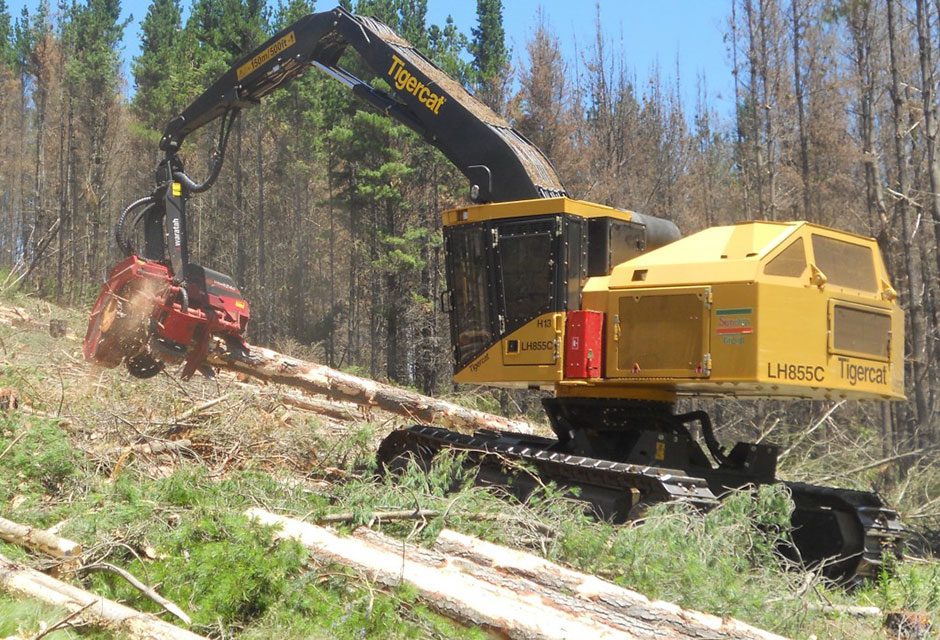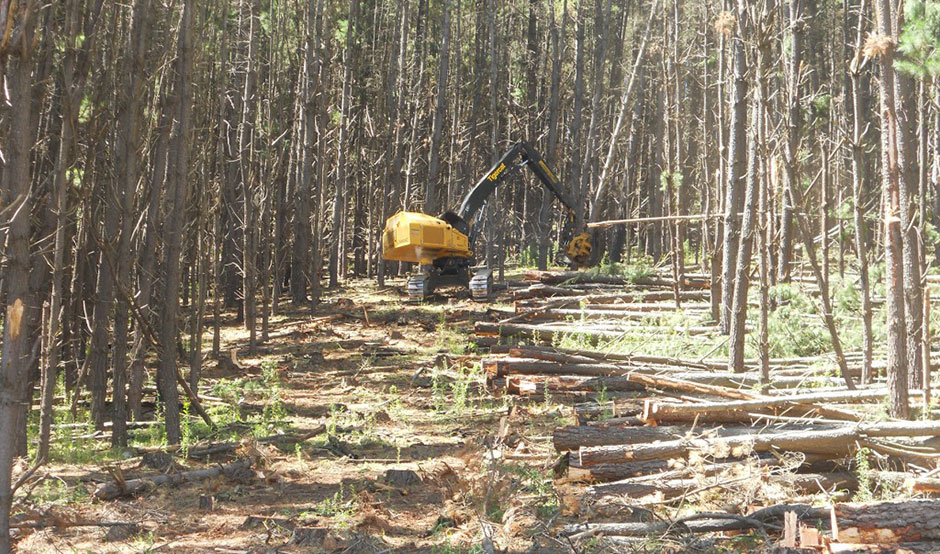1st April 2015
Passion, pride, and diversity is the key.
– Glen Marley, sales representative for Australasia and southeast Asia
Mark Blackberry formed the Sunchip Group based in Maryborough, southeast Queensland back in April 1997. Like most successful and passionate loggers, Mark had an early start. Growing up in the rugged region around Scottsdale in northeastern Tasmania, Mark has worked in the industry one way or another since childhood. He became an accomplished and well-regarded operator, so much so that after a stint in the Australian Football League or AFL (the highest-level professional competition in the sport of Australian rules football), Mark worked for Valmet Corporation for five years travelling extensively as a demo operator and sales specialist.

Sunchip Group’s Tigercat LH855C track harvester with a Waratah HTH624C harvesting head working in Tumut, New South Wales, Australia.
Since Sunchip’s inception in 1997, the company has been through periods of rapid growth followed by downsizing in response to the market and economic cycle. These days Sunchip is growing at a manageable and sensible rate after some hard lessons learned. The company employs 120 and the Queensland operation harvests and hauls approximately one million tonnes a year of Caribbean and slash pine, making Mark one of the highest volume loggers in Australia. The harvest comes from the sustainable Tuan and Wongi plantations around Maryborough and Gympie, Queensland, Australia.
Recently Sunchip was a runner-up for the highest transport industry award in Australia (Trucksafe Australia) and he is very proud that Sunchip is the first forestry-based company to achieve such a high honour.
Asked the secret to this success, the exceptionally proud family man suggests, “It’s very simple really, you just have to treat all of your employees, the forestry companies and all of the suppliers with respect and try to be helpful. If we don’t get that in return, then we won’t work with them.” Mark continues, “Most of our employees have been with us for over ten years, with some that have stayed on since our early days back in ’97, so I guess those simple principles I learned growing up playing footy are working out well.”
The company runs 30 B-double truck and trailer combinations (two tri-axle trailers joined with an extra fi fth wheel) with a payload of around 42 tonnes and a mixture of Tigercat, Komatsu, and Madill logging machines. “It’s a big investment,” says Mark. “Good staff give you the confidence to outlay all that capital, knowing that they’ll look after the gear, so that we can make some money out of it all.”
Mark collaborated with Tasmania-based trailer manufacturer, Elphinstone, to develop custom-built trailers to handle the 18,3 m (60 ft) full-stem trees for the Maryborough mill, the only full-stem operation in Australia. “We know that strong relationships with our suppliers help both parties to be innovative.”
Mark points out that the Sunchip group of companies is very diverse, and this diversity carries through to Mark’s own family. His wife Gina is a Doctor of Education. Sam, their son and eldest child, is in the Brisbane Lions AFL development academy and their three daughters are all talented in dance, acting and modelling, recently competing and performing for talent scouts in Orlando, Florida.

Sunchip Group’s LS855C fitted with the Tigercat 5195 directional felling saw in the Oberon region. The machine works its way uphill, laying large radiata pine perpendicular across the slope in a row.
Without doubt this mindset of diversity led Mark away from his previous preferred machinery supplier when he purchased two Tigercat 635D skidders in 2011 for the Queensland operations, where eight-wheel extraction machines had previously been used on the wet, sandy soils in the Tuan forest. Mark states that “those first Tigercat six-wheeled skidders really revolutionized our operations and gave us an increase in hourly production. When the king tides hit and water literally seeps up through the ground in the middle of the plantations even though the coastline is up to five kilometres away, availability still stayed high with the six wheelers.” He goes on to say that “the reliability alone from these units opened our eyes up so much so that after we had built a good relationship with [Australian Tigercat dealer] Onetrak, we then started looking at the other machines that Tigercat offered.”
In January, 2014 Mark purchased the first of his four Tigercat track machines, an LH855C fitted with a Waratah HTH624C harvester head. The machine went to work in Tumut, in southern New South Wales where Mark established the concept of using modern day leveling, felling and shovelling machines to replace the traditional cable operations that others had tried in the region. With extreme slopes in the rich clay region on the western side of the Snowy Mountains, part of Australia’s Great Dividing Range, these machines comfortably work on upwards of 60% slopes.
Sunchip recently purchased another LH855C harvester along with an LS855C fitted with the Tigercat 5195 directional felling saw for felling and shovelling large 1,2-1,8 m³ (1.75-2.5 ton) radiata pine in the Oberon region slightly north of Tumut. The machine works its way uphill, laying the trees perpendicular across the slope in a row. The HTH624C equipped LH855C processes the trees which are then extracted with a conventional forwarder.
Once the slope, terrain or moisture levels become too challenging for the forwarder, the LS855C will shovel the trees either up or down the slope to where the traditional ground based crew can process and extract them. Mark says, “This felling and shovelling concept that is now getting very popular in New Zealand isn’t really that new, but the reliability, safety and productivity of the Tigercats on steep slopes leave the other brands for dead. The modified ground based cut-to-length system is more expensive than a simple cut-to-length operation, but is cheaper and safer to run than the cable operations that were used in the past.”
With the addition of a flat-based Tigercat 860C equipped with the 5702 felling saw into his Queensland operations in May 2014, Mark clearly states, “I’m very happy with the Tigercat product and the passion that they have in supporting and developing the machines. Without doubt these machines are the best I have ever owned in their category. Tigercat is not afraid to listen to what the customer wants.”
During a quick trip to Canada last December, Mark and his son Sam were not only able to meet with senior management and engineering teams, but also saw the dedication, passion and quality that goes into all Tigercat machines, including Mark’s second LS855C shovel logger as it was being assembled on the shop floor. Mark continues to look for new opportunities to improve his company’s flexibility and states that his relationship with Tigercat is a big part of his plans going forward.